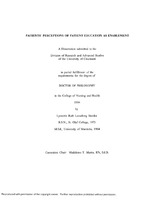Patients' perceptions of patient education as enablement
View File(s)
- Author(s)
- Details
-
Dr. Lynnette Leesberg Stamler, PhD, DLitt, RN, FAAN
- Sigma Affiliation
- Gamma Pi at-Large
- Phi
- Tau Upsilon
- Xi Lambda
Visitor Statistics
Visits vs Downloads
Visitors - World Map
Top Visiting Countries
| Country | Visits |
|---|
Top Visiting Cities
| City | Visits |
|---|
Visits (last 6 months)
Downloads (last 6 months)
Popular Works for Stamler, Lynnette Leeseberg by View
| Title | Page Views |
|---|
Popular Works for Stamler, Lynnette Leeseberg by Download
| Title | Downloads |
|---|
View Citations
Citations
The efficacy of nursing interventions such as patient education from the recipient's or participant's viewpoint has been studied infrequently. This qualitative study examines perceptions of participants in childbirth classes, represented by Lamaze classes. Semi-structured interviews are conducted at three points during the pregnancy/birth/recovery process. The seven participants were asked questions intended to elicit responses to the following research questions: (1) what are the reasons given for selecting and attending Lamaze classes when interviewed prior to attending; (2) what are the reasons given for selecting and attending Lamaze classes when interviewed after attending one or two classes; (3) what are the patient's perceived role(s) and task(s) during the birth process; (4) how does the perception of role(s) and task(s) change over time; and (5) does the patient perceive Lamaze classes as an enabling or non-enabling factor in fulfilling their perceived role(s) or task(s) during the birth process. The study data was the audio-taped interviews. Analysis of data was completed using both the computer software, Martin, and manual methods. Themes noted in response to the first two research questions included information and preparation, control, husband, rite of passage, anxiety/relaxation and socialization. All participants assigned themselves the task of maintaining control, and most believed they needed to assist their husband during the birth process. The self-assigned tasks did not change over time. Three of the participants definitely believed that the classes had assisted them in achieving their goals, one was ambivalent, and three were equally sure that the classes had not met their needs. The results of the study were compared to the theoretical concepts of enablement, mastery and role supplementation. Implications for nursing practice and education were offered, and further research areas identified.
This dissertation has also been disseminated through the ProQuest Dissertations and Theses database. Dissertation/thesis number: 9424555; ProQuest document ID: 304098090. The author still retains copyright.
This item has not gone through this repository's peer-review process, but has been accepted by the indicated university or college in partial fulfillment of the requirements for the specified degree.
| Type | Dissertation |
| Acquisition | Proxy-submission |
| Review Type | None: Degree-based Submission |
| Format | Text-based Document |
| Evidence Level | Other |
| Research Approach | Qualitative Research |
| Keywords | Patient Education; OBGYN Nurses; Female Patients |
| CINAHL Subject(s) | Perception; Childbirth Education; Maternal Role; Perception--Evaluation; Childbirth Education--Evaluation; Maternal Role--Evaluation; Perception--Evaluation--In Pregnancy; Childbirth Education--Evaluation--In Pregnancy; Maternal Role--Evaluation--In Pregnancy |
| Grantor | University of Cincinnati |
| Advisor | Martin, Madeleine T. |
| Level | PhD |
| Year | 1994 |
All rights reserved by the author(s) and/or publisher(s) listed in this item record unless relinquished in whole or part by a rights notation or a Creative Commons License present in this item record.
All permission requests should be directed accordingly and not to the Sigma Repository.
All submitting authors or publishers have affirmed that when using material in their work where they do not own copyright, they have obtained permission of the copyright holder prior to submission and the rights holder has been acknowledged as necessary.
Related items
Showing items related by title, author, creator and subjects.
-
The use of simulation in clinical faculty development
Loftus, Joan Grady; Stamler, Lynnette Leeseberg; Foronda, Cynthia L. (2017-10-13)Simulation has been used extensively to teach and evaluate the clinical practices of nursing students but rarely is simulation utilized to teach clinical faculty. By providing active learning and prompt feedback faculty-centered ... -
The perception of physical activity and social support for physical activity among Native Hawaiians 55 Years and older
Hanashiro, VernaSignificance: The benefits of physical activity on healthy aging and longevity have repeatedly been identified. Despite these known benefits, sedentary living is a serious and pervasive health problem among older adults ... -
Expanding diversity: Disability-related competency development for BSN curriculum
Kronk, Rebecca A.; Stamler, Lynnette Leeseberg; Smeltzer, Suzanne C. (2017-10-13)The next generation of nurses must be equipped to care for individuals with disabilities across the life span. This leadership project addressed the gap in BSN education to better prepare undergraduate nursing students to ... -
A way toward ensuring a relevant undergraduate curriculum: BSN curriculum assessment plan
Palazzo, Steven J.; Sharts-Hopko, Nancy C.; Stamler, Lynnette Leeseberg (2017-10-13)Responsive-situational leadership strategies were used to lead and engage a team of college of nursing faculty in the development, implementation, and evaluation of a comprehensive BSN curriculum assessment plan. -
Engaging and retaining Sigma's retired members
Grigsby, Karen A.; Schultz, Alyce A.; Graiver, Mary; Stamler, Lynnette Leeseberg; McDaniel, Anna M.Retired Sigma members represent a valuable membership segment, with the knowledge and experience to lead, educate and mentor younger members. How can chapters help support and retain this important segment of career nurses? ...





